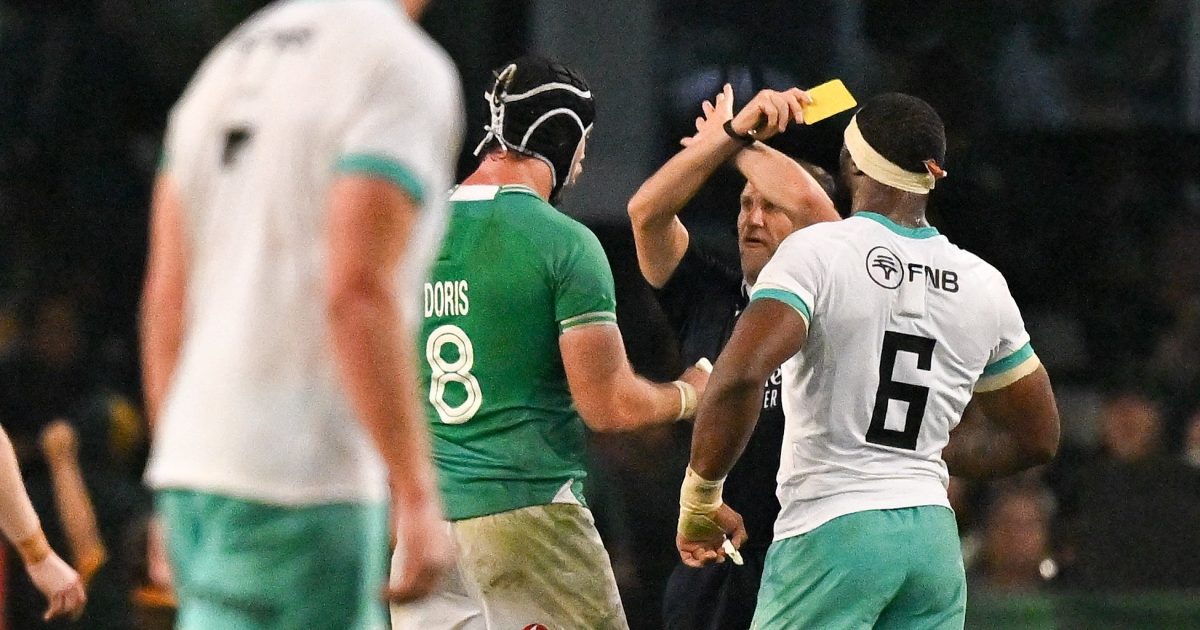The hot zones referees will clamp down on during Autumn Nations Series

World Rugby has released a video in which referees talk about the focus areas for match officials ahead during the 2024 Autumn Nations Series.
Filmed with match official Karl Dickson, the video highlights several key areas of focus; including contests in the air, improved access to the ball for the catcher and a renewed emphasis on obstruction prevention.
Matchday officials will be particularly hot on fair contests from kicks, an area where blocking and gamesmanship have been rife of late. This is not a law change but rather a renewed application of current laws which is designed to support open and unstructured play and help create more attacking opportunities.
Also featured is the ongoing 20-minute red card trial. The policy allows teams to replace a player sent off after 20 minutes.
While the 20-minute red card has its critics. World Rugby say it aims to balance punishment while sustaining game flow and enabling more competitive and engaging matches. It’s important to note that referees can still issue straight red cards.
The ‘Bunker’ system is also available for incidents requiring further review. Players sanctioned for dangerous foul play will face extended suspensions without mitigation unless appealed, ensuring that bans serve as a deterrent.
Recent statistics appear to suggest the new Law trials are working. Ball-in-play time has increased by over 2.5 minutes, reaching 33+ minutes per game. Overall match time has been reduced by 3–5 minutes due to fewer stoppages.
Restart contestability is also up 45 per cent, with a noticeable increase in dynamic mauls and faster set-piece setups, while goal kicks are now 15 seconds quicker on average. The play-on approach for not-straight lineouts has helped to reduce lineout infringements.
The 20-minute red card trial is also supported by data from the past season, which indicates a 37 per cent reduction in players entering ‘Tackle School’—a program designed to educate on tackle technique as a condition for reduced suspensions—while reoffending rates remain below six per cent globally. Concussion rates have stabilized while red card incidents have decreased, suggesting a shift in player behaviour.
These trials will undergo thorough review and analysis by the World Rugby Executive Board and Council during and after the November Tests to determine their long-term viability.


























The 20m red card is a new card, which we could call an orange card, or something equivalent. It's a good idea to separate misjudged tackles from malice forethought. But framing it as a red card variation is not helpful.
They might want to do a session on the balance between onfield coaching of players out of infringements versus penalizing the infringement directly. Refs can appear to favour one team over the other if they get the balance wrong.
Angus Gardiner was heard on multiple occasions coaching the English around offending at the ruck & even praising them for obeying him. A bit of this is expected but there must come a time where the ref just does their job. It also avoids accusations of bias.
Angus Gardiner was clearly heard to tell players " not all head contacts are the same".
In comparison of how ALB's head clash incident was dealt with, it wouldn't have been given a yellow or sin bin by Rugby League referees, just a penalty, on report, play on.
So far Rugby Union have copied from Rugby League:
Gaol line drop out.
50-22 (40-20).